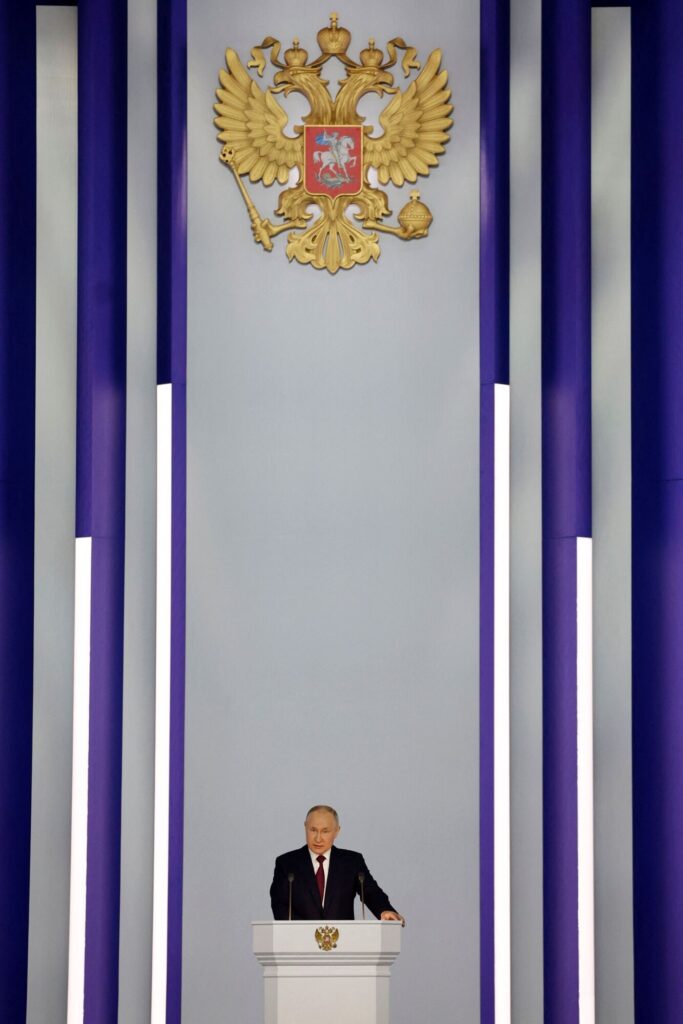February 13, 2024 at 11:00 AM GMT
On a summer evening at a beachside nightclub in the Black Sea resort of Sochi, the atmosphere resembled a modern-day rendition of a gladiator spectacle in imperial Rome. Russian fighters clashed with a “world” team in a mixed martial arts contest, while scantily dressed women waved Russian flags and the crowd erupted with every victory by the home squad. The climax came with the knockout of a 44-year-old American fighter.
This event unfolded in August 2013, with Vladimir Putin seated in a front-row seat, donning a white dress shirt and flanked by security guards and political allies. Just six months later, Russia’s president initiated a course toward conflict by annexing Crimea from Ukraine, leading to a full-scale invasion that enters its third year next week.
The scene in Sochi epitomized Putin’s worldview: a meticulously orchestrated display of Russian strength in response to what he perceives as disrespect for his country’s position in the global order. As the authoritarian leader gears up to solidify his power in an upcoming election next month, the imperative of how to confront him has become even more pressing, especially after Republican frontrunner Donald Trump hinted that, if re-elected in the US, he might allow Russia to target NATO countries failing to meet their defense spending commitments.
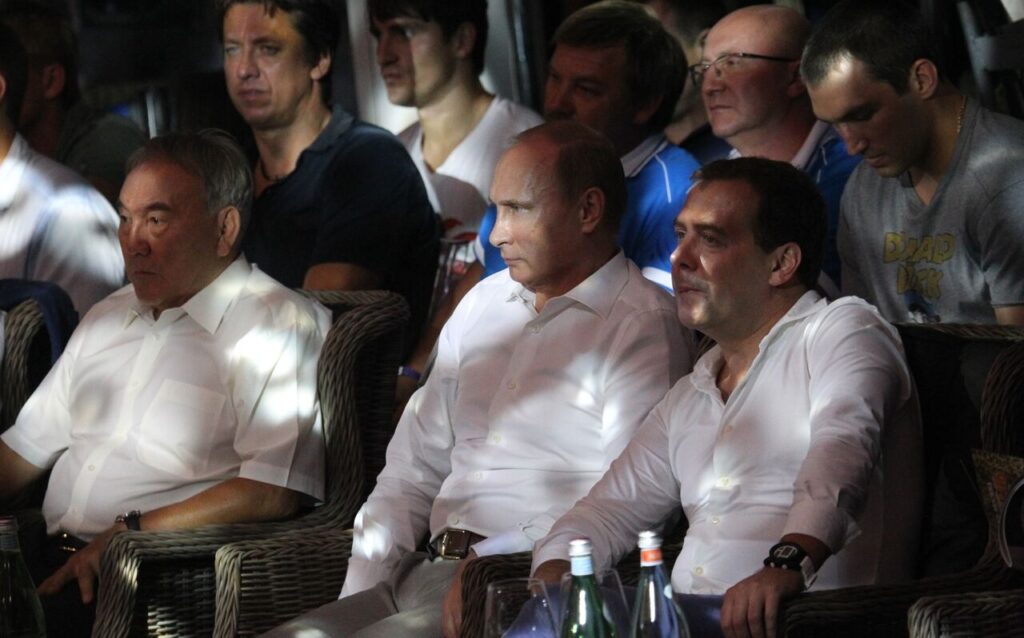
Putin, center, during the League S-70 International Championship Fights in Platforma club in Sochi, Russia, in August 2013Photographer: Sasha Mordovets/Getty Images
In Ukraine, Putin is orchestrating a decisive move against the US and Europe, aiming to reshape the global order to Russia’s advantage. Backed by military force and longstanding grudges, Putin’s calculated gamble is that he can manipulate the world to bend to his will. China, with its own territorial aspirations, closely monitors how far Russia can push the boundaries.
“He sits on his throne, overseeing the entire scheme, seeking to exploit and capitalize on every international circumstance to advance,” remarked Fiona Hill, a former senior White House advisor on Russia. “Putin may appear to be suffering significant setbacks, but in his mind, he’s winning.”
With encouragement from Trump, Republican opposition in the US to continue arming Ukraine is gaining momentum. Billionaire Elon Musk recently urged Americans to lobby Congress against funding for Ukraine, asserting there’s “no way in hell” Putin can lose the war.
The trajectory of Putin’s journey unfolds in three distinct phases, drawn from previously undisclosed scenes and conversations with former heads of state, diplomats, and senior Kremlin officials spanning over a decade. He emerged from the shadows as a KGB agent to lead Russia after the tumultuous 1990s under Boris Yeltsin. Subsequently, he dismantled the oligarchy that emerged from communism, consolidating power as an all-powerful ruler. Now, he stands as a wartime leader, striving to prevent his invasion of Ukraine from becoming an Afghanistan-like failure that hastened the collapse of the revered Soviet Union.
At 71, Putin is poised for a fifth term, despite hundreds of thousands of Russians being killed or wounded in a war that has largely reached a stalemate against Ukrainian forces. The Ukrainians themselves struggle to advance as weapons supplies from their US and European allies dwindle.
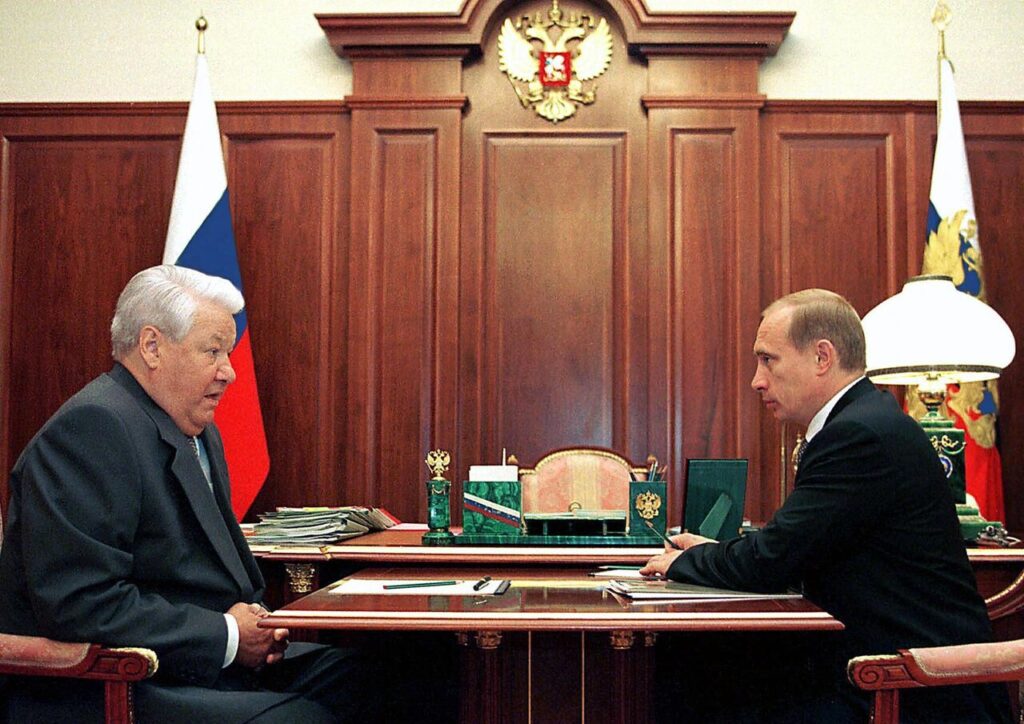
Putin, right, with Russian President Boris Yeltsin in the Kremlin, in September 1999.Source: AFP/Getty Images
In the upcoming March 17 election, Putin faces no significant contender, ensuring another six-year term as president. Sources from his early days in office, 20 years ago, reveal he wasn’t certain he would last beyond his initial term. The Kremlin is intent on framing his victory as a resounding endorsement of the invasion.
Simultaneously, Putin is rapidly molding Russian society to mirror his vision. He has fueled patriotic sentiment by evoking nostalgia for Russia’s imperial and Soviet heritage, while simultaneously enforcing some of the harshest repression seen in decades. Presenting himself as the guardian of Russian sovereignty and traditional Orthodox Christian principles, he positions Russia against the perceived liberalism of the West.
While his incursion into Ukraine has triggered Europe’s most significant conflict since World War II, the extent of the rupture between Russia and the West over the past two years remains staggering for many to grasp.
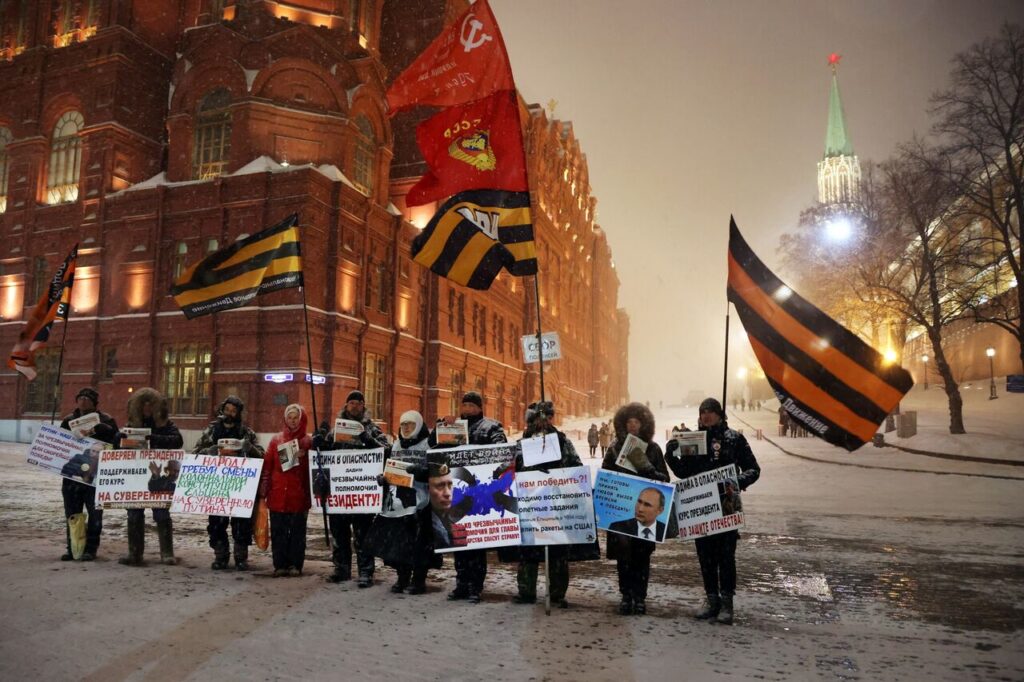
Members of the Russian National Liberation Movement during a rally in support of Putin near the Kremlin on Feb. 6.Source: Getty Images
Following Putin’s re-election in 2018, Russia welcomed hundreds of thousands of international guests for the FIFA World Cup. Among them, French President Emmanuel Macron attended the Moscow final, witnessing France’s victory.
Macron was one of several leaders seeking to leverage his personal rapport with Putin. His primary concern was Russia’s potential alignment with China if Europe distanced itself. In 2019, Macron extended an invitation to Putin at his summer residence, where the Russian president arrived bearing flowers for Macron’s wife, Brigitte. However, the relationship took a turn a year later when Putin suggested to Macron that opposition figure Alexey Navalny, who had survived an assassination attempt in Russia, may have poisoned himself.
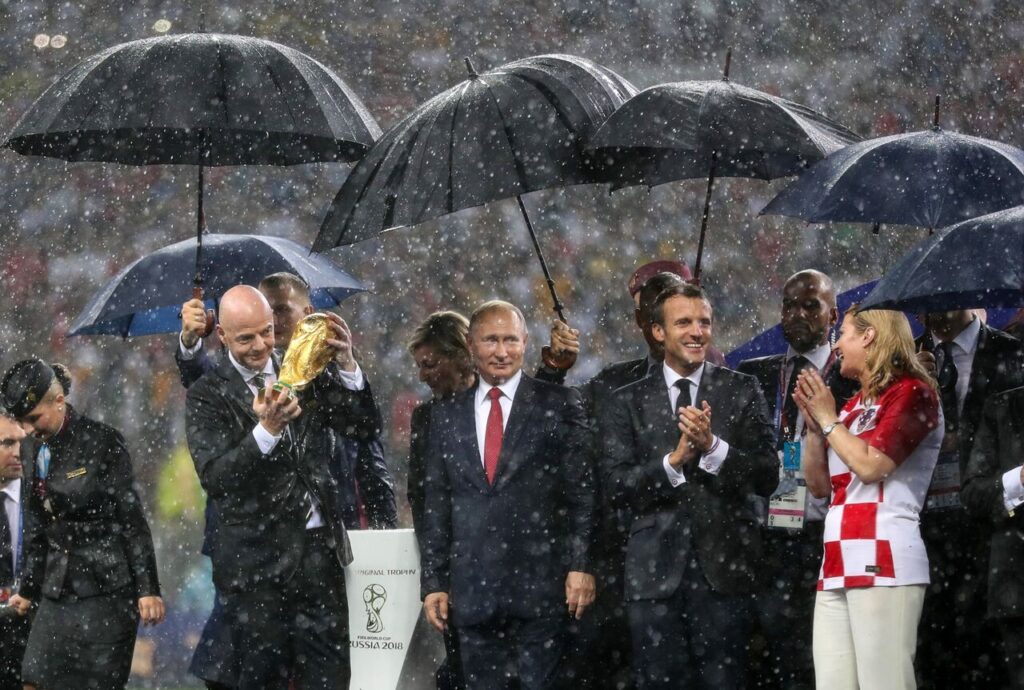
Putin, center, with Macron, second right, and Croatian President Kolinda Grabar-Kitarovic at the 2018 FIFA World Cup Final in Moscow on July 15, 2018.Photographer: Stefan Matzke/Corbis Sport/Getty Images
Former Czech President Milos Zeman, previously viewed as Russia-friendly in Moscow, admitted misjudging Putin, especially regarding his intentions in Ukraine.
“I believed that Vladimir Putin was rational, not emotional, that he wouldn’t take actions objectively detrimental to the Russian Federation’s interests,” he stated in an interview. “That’s why I publicly asserted, shortly before the Russian aggression, that Russians wouldn’t be foolish enough to attack Ukraine. Unfortunately, it turned out they were foolish.”
This narrative contrasts sharply with the dynamic, judo-loving leader who succeeded the ailing Yeltsin, initially eager to collaborate with the US and Europe. During that initial period, Putin even floated the idea of Russia joining the NATO alliance, which he now deems an existential threat to his nation’s security.
This was the Putin who reached out as the first foreign leader to offer support to US President George W. Bush after the September 11, 2001, terrorist attacks. Furthermore, then UK Prime Minister Tony Blair journeyed to St. Petersburg for discussions with Putin while he served as acting president in March 2000. The duo attended a performance of Sergei Prokofiev’s opera “War and Peace.”
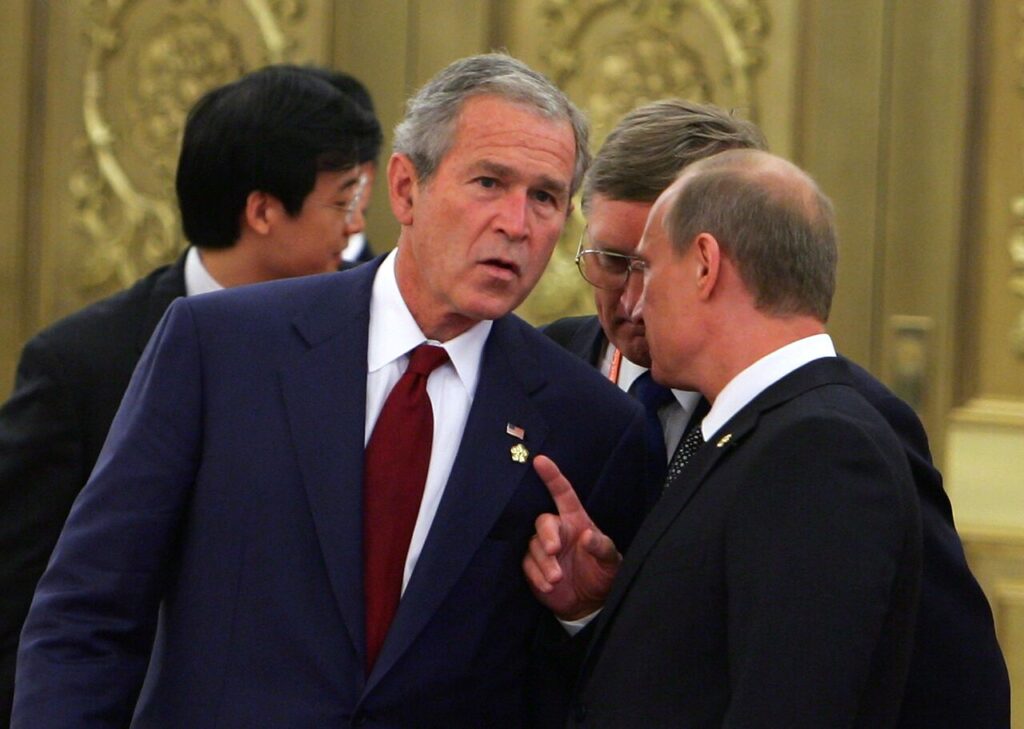
Putin speaks with US President George W. Bush at the Great Hall of the People in Beijing, Aug. 8, 2008.Photographer: Guang Niu/Getty Images
Putin criticized the West for his earlier suggestion to join NATO during a speech at the annual meeting of the Valdai Discussion Club, a Russian think-tank, held in Sochi in October. Reflecting on the post-Soviet era and the end of the Cold War, he remarked, “We believed we became part of the crowd,” suggesting that the West’s geopolitical interests and arrogance hindered closer ties.
According to a senior adviser to Putin at the time, the Russian leader genuinely sought to foster better relations with the West. He engaged not only with foreign leaders but also with ministers and sometimes even ambassadors to articulate his perspectives, even on contentious topics like the Chechen conflict. However, despite Putin’s efforts, the Russian military remained skeptical about the prospect of an alliance with NATO.
“We in the Defense Ministry never received any orders indicating the seriousness of such intentions,” remarked Evgeny Buzhinsky, a former general who served in the ministry’s international relations department from 2002 to 2009.
Gradually, a sense of resentment took hold. Putin often left meetings with US representatives feeling frustrated. Over time, disillusionment with the West evolved into a feeling of betrayal, particularly regarding US plans for a new missile-defense system in Europe.
Tensions came to a head during Putin’s infamous speech at the Munich Security Conference in 2007. Addressing Western leaders, he criticized NATO expansion and labeled it “a serious provocation.”
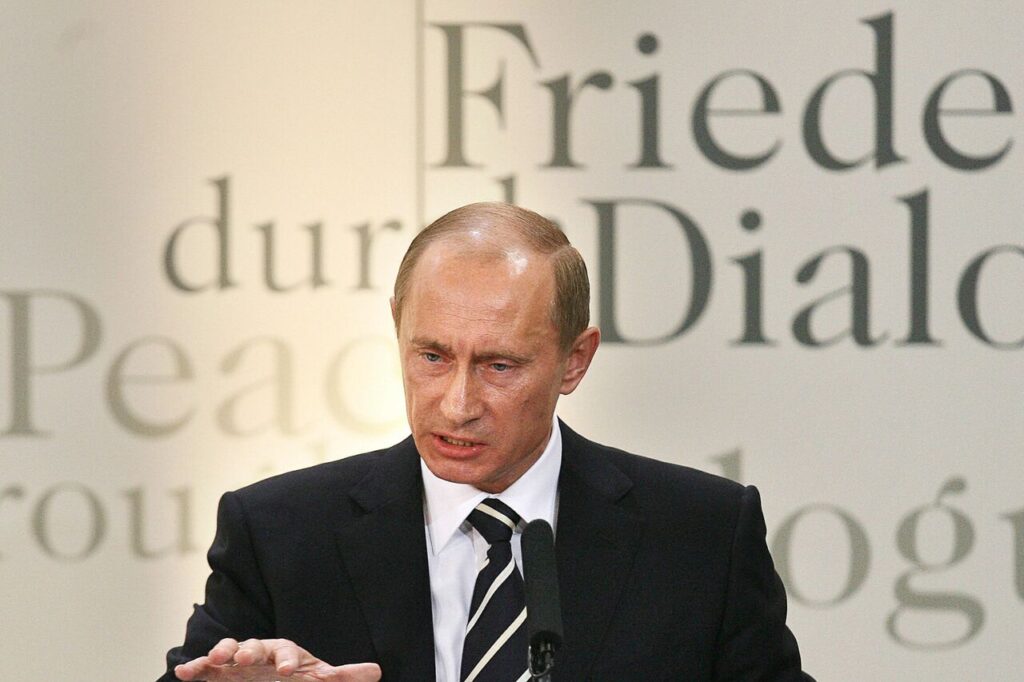
Putin delivers a speech at the Munich Security Conference on Feb. 9 2007.Photographer: Oliver Lang/DDP/Getty Images
“He fundamentally misread American interest and politics,” remarked William Burns, former US ambassador to Moscow and current CIA director, in his 2019 book “The Back Channel: A Memoir of American Diplomacy and the Case for Its Renewal.” According to Burns, the US viewed Russia as “a power in strategic decline” during Putin’s early years, and there was no perceived need to engage in discussions about long-term bipartisan priorities and partnerships in Europe to appease Putin.
With booming oil and gas prices bolstering the Kremlin’s finances and facilitating an economic recovery from the post-Soviet collapse, Putin initiated a rearmament program that spanned over a decade, allocating hundreds of billions of dollars to modernize Russia’s military.
“The US also dropped the ball,” remarked Ben Hodges, former commander of the US Army in Europe. “We were unrealistic about the Russian threat between 2010 and 2014, and now we’re paying the price for that.”
At NATO’s 2008 summit, when the organization first considered potential membership for Ukraine and Georgia, Putin cautioned then-President Bush that Ukraine would face dire consequences if it joined the alliance, as reported by the Russian newspaper Kommersant. Months later, a brief conflict in Georgia saw Russian forces advancing toward the capital, Tbilisi, solidifying Putin’s control over two breakaway regions.
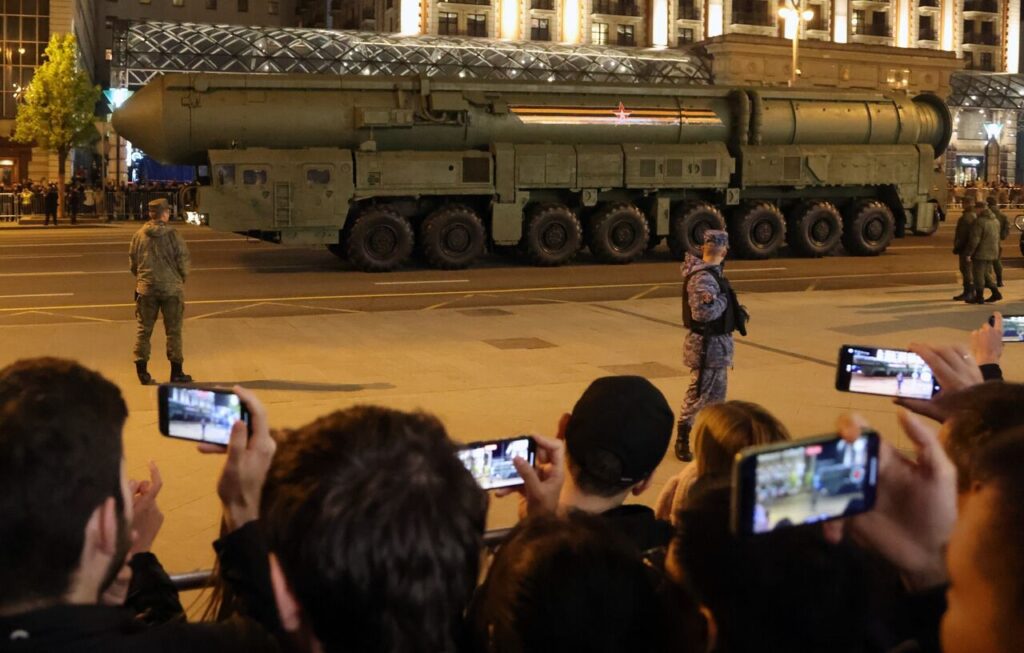
A Russian RS-24 Yars intercontinental ballistic missile on Tverskaya Street during rehearsal for the Victory Day military parade in Moscow in May last year.Source: Getty Images
By then, Putin was serving as prime minister, having designated Dmitry Medvedev to assume the presidency for four years in 2008 to adhere to term limits outlined in Russia’s constitution. In September 2011, Medvedev announced his decision to step aside and pave the way for Putin’s return to the Kremlin.
Behind the scenes, influential allies concerned about losing power and financial benefits to Medvedev’s circle openly rooted for Putin’s reinstatement. Although Medvedev was younger, more pragmatic, and a technocrat, Putin was seen as the guarantor of stability. According to a prominent figure in Russia in 2012, Putin’s absence would render the system vulnerable.
The NATO-led intervention in Libya’s civil war in 2011, sanctioned by a United Nations resolution that Medvedev abstained from, marked a critical turning point. Putin was reportedly appalled when he witnessed footage of a mob lynching and mutilating Libyan leader Moammar Qaddafi. A source familiar with the matter revealed that Putin concluded Medvedev was insufficiently assertive in dealing with the West.
In the March 2012 elections, Putin secured two-thirds of the vote, despite facing the largest demonstrations against his rule. These protests notably attracted segments of Russia’s entrepreneurial and creative middle classes, seeking greater political participation. Following his ceremonial presidential motorcade through deserted Moscow streets to his inauguration in May, the Kremlin initiated a broad crackdown, arresting opposition activists, and branding non-governmental organizations as “foreign agents.”
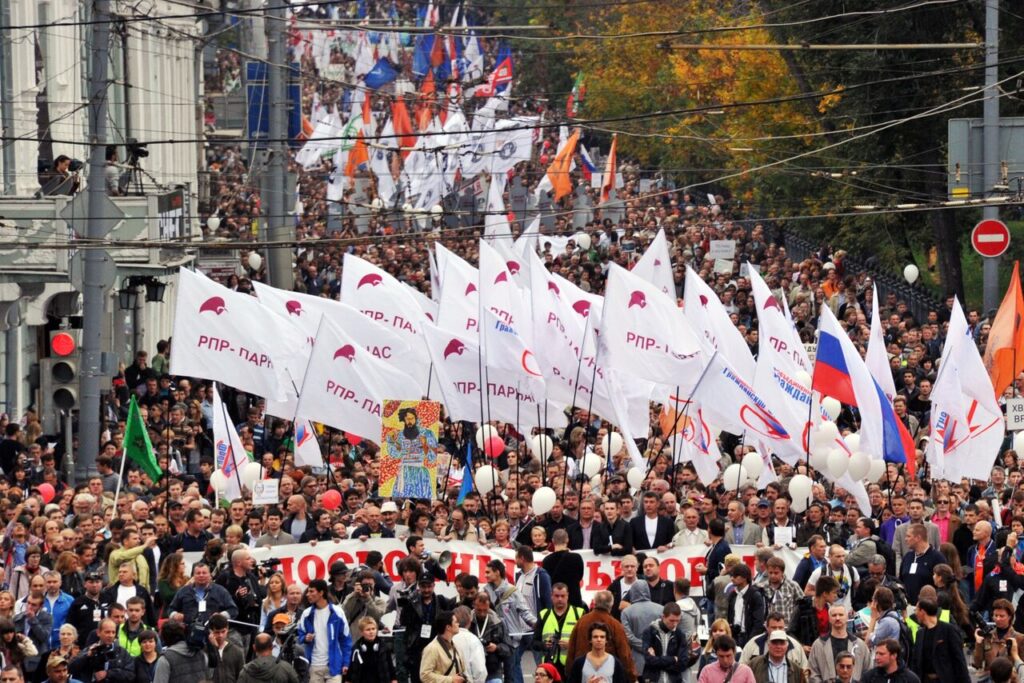
Opposition activists take part in an anti-Putin protest in Moscow in September 2012.Photographer: Yuri Kadobnov/AFP/Getty Images
Returning to office, Putin increasingly appealed to Russians nostalgic for the certainties of the Soviet era, particularly in the nation’s provinces, solidifying his political support base. He engaged in attention-grabbing stunts, often appearing shirtless, cultivating a macho persona that resonated with his core followers.
Prior to the 2014 annexation of Crimea, polls indicated a decline in Putin’s approval ratings. However, the surge of nationalism following the Crimea seizure propelled his support to over 80% for several years.
The military intervention occurred shortly after Russia hosted the Winter Olympics in Sochi, an event for which Putin allocated a record $50 billion to portray Russia as a sporting powerhouse. Despite Russia topping the medal count in Sochi, the team was embroiled in a doping scandal orchestrated by Putin’s security service, leading to a ban from all Olympic competitions.
Putin himself attempted to mislead the international community by denying involvement with the “little green men” who clandestinely occupied Crimea in unmarked uniforms. This denial was later revealed to be a blatant falsehood, as Putin acknowledged a year later that the soldiers were indeed Russian. Consequently, Russia was expelled from the Group of Eight nations, and the US and Europe imposed sanctions in response.
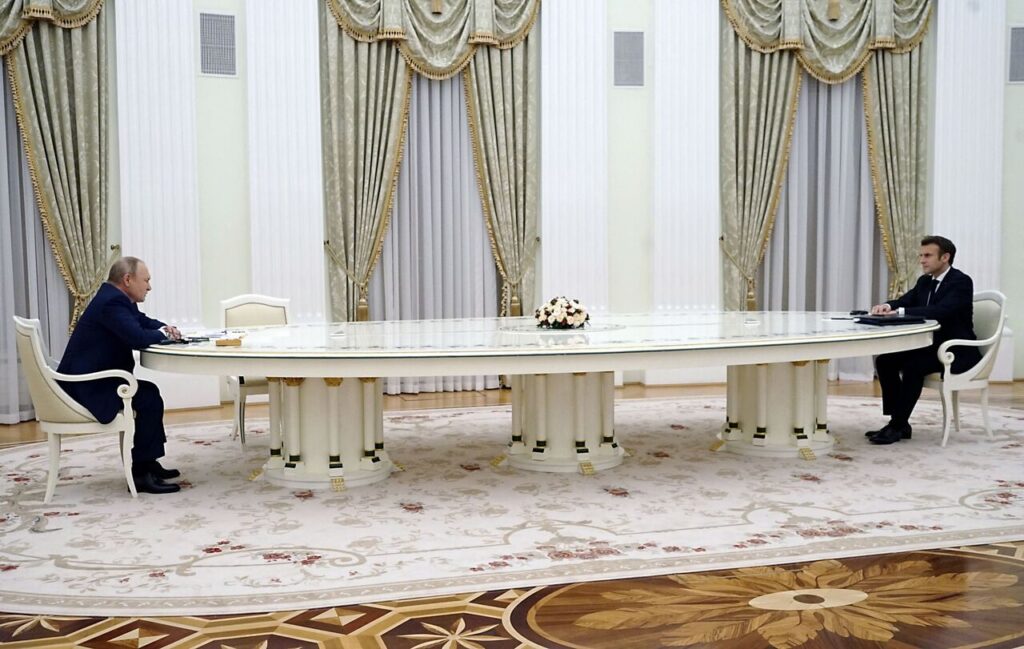
Putin, left, meets with Macron, for talks in an effort to find common ground on Ukraine and NATO, in Moscow on Feb. 7, 2022.Source: AFP/Getty Images
The relatively subdued international reaction to the annexation and Putin’s surge in domestic popularity reinforced his belief that he is not merely a fortunate leader but one divinely inspired, according to individuals close to the Kremlin. Vyacheslav Volodin, then the Kremlin’s deputy chief of staff, conveyed to foreign academics and analysts at a 2014 Valdai meeting that “if there is Putin, there is Russia. No Putin, no Russia.”
This pattern of deception recurred prior to the full-scale invasion in February 2022, with Putin adamantly denying any intentions for war until the eleventh hour. Indeed, his capacity to unflinchingly deceive fellow leaders during discussions was cited as one of Putin’s most disconcerting traits by a European official who participated in numerous meetings with him over more than a decade. As the specter of war loomed larger, Putin increasingly relied on lengthy diatribes concerning the West’s alleged mistreatment of Russia, according to the same source.
A leader of a non-NATO nation who engaged in dialogue with Putin shortly before the outbreak of war recounted spending approximately 30 minutes discussing Ukraine, during which Putin vehemently asserted he had no intentions of invading. When asked about feeling personally betrayed by Putin, the leader remarked, “He deceived everyone, not just me.”
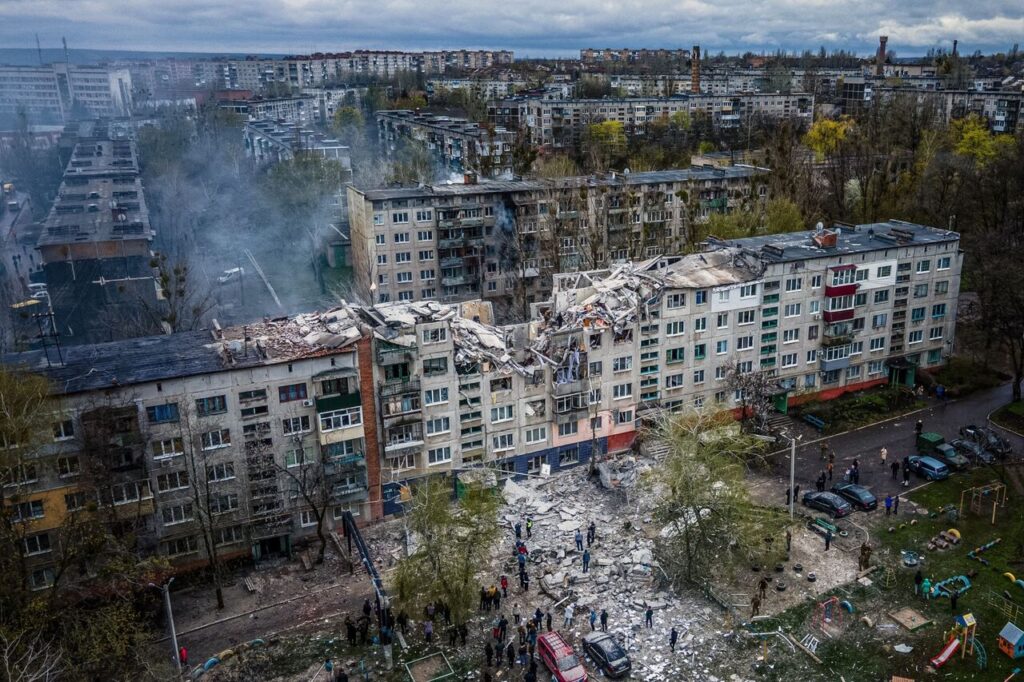
A rescue operation at a partially destroyed residential building, following a shelling, in Slovyansk, Ukraine, last April 14.Photographer: Ihor Tkachov/AFP/Getty Images
The Covid-19 pandemic underscored Putin’s unique position as the Kremlin implemented stringent protective measures around him, mandating that anyone meeting with the president endure a two-week quarantine period beforehand, even for brief encounters. Meanwhile, Russians faced comparatively lighter restrictions than many European nations.
According to Ekaterina Schulmann, a non-resident scholar at the Carnegie Russia Eurasia Center in Berlin, the isolation had a more profound impact on Putin’s mindset than commonly recognized, fostering his resentment toward the West.
“The president found himself in an even more insular bubble,” Schulmann remarked, having been designated a “foreign agent” in Russia.
In the summer of 2021, German Chancellor Angela Merkel expressed concern to one of her allies about the potential for impulsive actions by Putin or Chinese President Xi Jinping, given the absence of personal bilateral exchanges among leaders during the pandemic.
A person who interacted with Putin in 2021 recounted being taken aback as the president spent 25 minutes lecturing about the perceived threat posed by the US and its allies to Russia, harboring deep-seated resentment.
For years, Putin staunchly maintained he wouldn’t alter Russia’s constitution to prolong his tenure. However, amid the global response to the coronavirus, he did precisely that in early 2020.
The pivotal amendment enabling him to reset term limits was proposed by Valentina Tereshkova, a loyal lawmaker and the first woman in space. It granted Putin the option to seek two additional terms, potentially extending his rule until 2036. The extent of the law’s provisions caught many involved by surprise.
The conflict in Ukraine has proven to be a debacle for Russia on multiple fronts. The invasion, intended to secure a swift victory, shows no signs of resolution. It has tarnished Russia’s military image and expanded NATO’s border following Finland’s accession last year.
While comprehensive international sanctions have yet to cripple Russia’s economy, the Kremlin has resorted to bolstering the ruble with capital controls and depleting the national wealth fund to support military expenditures and business relief measures. Moreover, Russia has forfeited access to $300 billion in frozen foreign reserves.
Crimea remains vulnerable to repeated drone and missile attacks from Ukrainian forces, prompting the relocation of Russia’s Black Sea fleet. Additionally, Putin’s control over four regions of eastern and southern Ukraine, purportedly annexed “in perpetuity” nearly 18 months ago, remains incomplete.
CIA Director Burns noted Putin’s unwavering fixation on controlling Ukraine and its decisions, believing such control is indispensable for Russia’s status as a great power and his own legacy as a significant Russian leader.
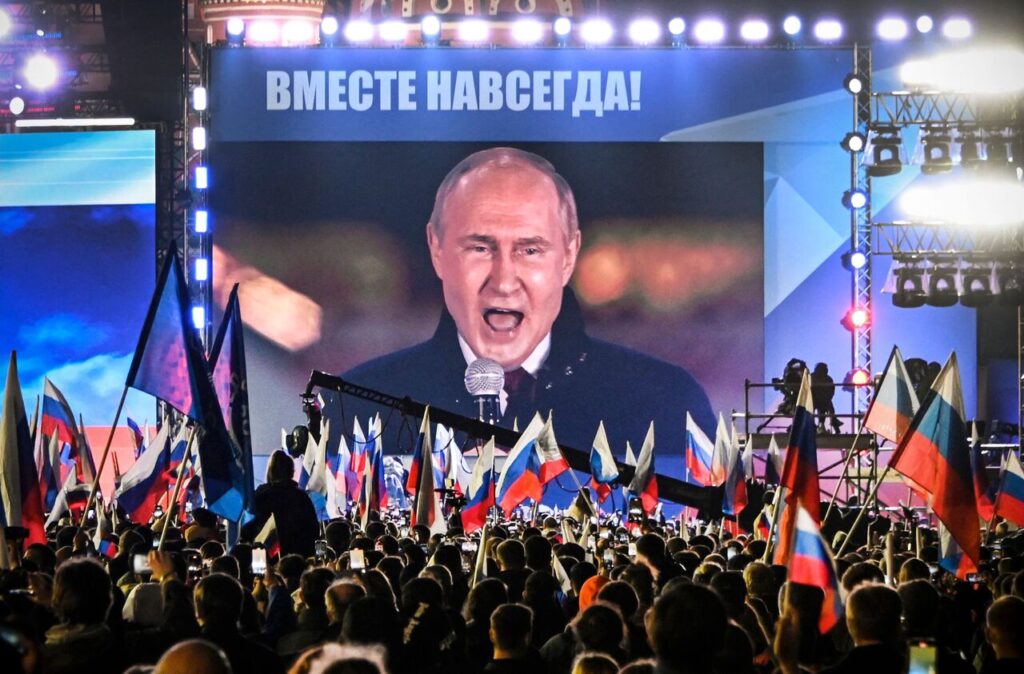
Putin on a screen in Moscow’s Red Square as he addresses a rally and a concert marking the annexation of four regions of Ukraine.Photographer: Alexander Nemenov/AFP/Getty Images
Meanwhile in the United States, President Joe Biden appears to be on track for a potential rematch with his predecessor, Donald Trump, who has voiced disapproval of the military assistance provided by Washington to Ukraine.
Putin, however, isn’t necessarily banking on Trump’s return to the presidency, considering his first term was viewed as “a great disappointment” for Russia, lacking any substantial breakthroughs, as noted by Tatiana Stanovaya, founder of R.Politik, a political consultancy, and a senior fellow at the Carnegie Russia Eurasia Center. Following meetings with Trump, a Kremlin insider remarked that Russia simply couldn’t comprehend his intentions.
There’s a certain enigmatic quality about Putin that convinces Kremlin circles he will emerge victorious from even the most daunting crises. He leverages his enduring presence as a means to outlast the United States and Europe, whose leadership and policies undergo frequent changes.
Putin once derided a reporter’s inquiry about ruling until 2030, stating he had no aspirations to occupy the Kremlin throne until the age of 100. In reality, he would be 77, younger than Biden and the same age as Trump at present.

